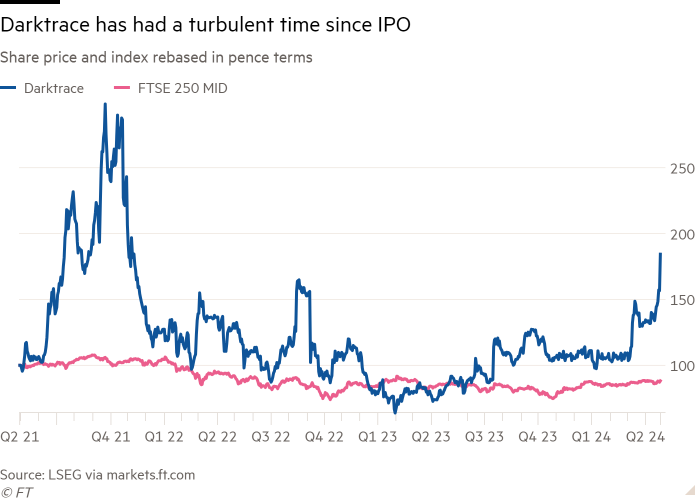Unlock the Editor’s Digest for free
Roula Khalaf, Editor of the FT, selects her favourite stories in this weekly newsletter.
Another light of the London Stock Exchange firmament is going out. Darktrace has accepted a £4.3bn offer from US private equity investor Thoma Bravo. That the UK market’s lone cyber security name is leaving will, of itself, raise eyebrows. That it is willing to do so for a relatively low price is a reflection of its troubled life as a public company.
None of this is supposed to imply that Thoma Bravo’s latest offer — which follows an aborted approach in 2022 — is devoid of attractions. With $138bn of assets under management, it is one of the largest software-focused investors in the world and can support Darktrace’s strategy. It can use its clout to help the UK group expand its US client base. And it can provide Darktrace with capital and M&A expertise to snap up other companies in the fragmented cyber security space.
Financially, however, Thoma Bravo’s bid doesn’t look like a knockout. True, at 620p a share Darktrace is getting a 44 per cent premium on its three-month average share price, and a 148 per cent premium on its IPO price three years ago. That may explain why long-term investors KKR and Summit Partners have committed to tender their 11 per cent of the company, as have directors and insiders with a further 3 per cent.
But that isn’t the whole story. Darktrace has long been poorly valued. Even at the offer price, it is only worth 7.3 times 2024 sales, on Panmure Gordon estimates. By contrast, US cyber security group CrowdStrike trades at 17 times revenues, and Palo Alto at 11.5 times. These companies are giants, compared to Darktrace, and scale commands a premium. Yet it is hard to shake the impression that Darktrace may be selling itself cheaply, especially given its improving results and the recent share price run.

By accepting Thoma Bravo’s offer, of course, Darktrace has in effect put itself in play. “Irrevocable” commitments, like those made by 14.4 per cent of shareholders, can be undone. Other suitors may yet emerge, pushing up the premium.
But the cyber specialist, still among the better performers of the IPO crop of 2021, has had a very bumpy three-year ride as a public company. It has had to deal with accounting concerns, vocal short sellers and its uncomfortable association with Autonomy’s Mike Lynch, Darktrace’s co-founder who is facing a fraud trial in the US where he has pleaded not guilty.
All that comes before you get to the much-discussed and debated valuation discount for UK-listed stocks. Perhaps it is little wonder that Darktrace did not hold out for top dollar.
camilla.palladino@ft.com

